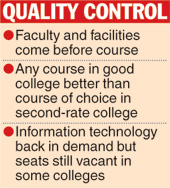 |
Students have become the quality-control mechanism that Bengal’s private engineering institutes had lacked, turning down seats in colleges without the right faculty and facilities even if it means losing the chance to pursue their courses of choice.
“I would rather opt for any course that comes my way in a good college than do IT — my first preference — in an institute without proper infrastructure or a good placement record,” a student from Howrah told Metro, emerging from a counselling centre.
As many as 6,238 of the 28,000 engineering seats in the state remained vacant after the second — and last — round of counselling on Sunday despite the number of candidates exceeding 60,000. The list includes seats in core courses like civil, mechanical and electronics engineering, which were the most sought-after during the downturn.
“The number of vacancies is very high even if we account for the fact that 3,000 seats were added this year. Earlier, students would compromise on the quality of a college as long as they got into the courses of their choice,” an official said.
Siddhartha Dutta, the chairman of the West Bengal Joint Entrance Examinations Board, confirmed the trend, which coincides with a Rs 29,000-a-year fee hike in private engineering colleges. “Students grabbed all the seats on offer in some colleges while those in many institutes had no takers,” he said.
Abacus Institute of Engineering and Technology and Greater Kolkata Institute of Engineering and Technology, both of which were recently taken over by the JIS Group, are among the colleges where some classrooms are set to go almost empty.
Taranjit Singh, the head of the JIS Group and the general secretary of the state association of owners of private engineering institutions, admitted that this year’s counselling was an eye-opener.
“There are some minor problems in the new institutes we have taken over. We have planned a makeover in a year or two,” said Singh.
According to sources, Aryabhatta Institute of Engineering and Management and Kanad Institute of Engineering and Management have also found few takers this year. Pradip Agasthi, the chairman of the trusts that run the two colleges, attributed the “low turnout” to the delay in holding counselling.
JIS Group head Singh contested allegations about the colleges with vacant seats being unfit to churn out quality engineers and attract big companies for campus recruitment. “Some colleges do fail to maintain high standards. But no college can be termed inferior because the All India Council of Technical Education gives permission to run an institute only if it fulfils all the criteria,” he explained.
So how do students make informed choices in the absence of official appraisal?
“Students are very well informed these days. The Internet is also a big help in researching the strength of faculty and infrastructure, examination results and placement records. Students’ opinion is the best indicator of the quality of colleges,” said a teacher at Jadavpur University, which is in the top bracket along with Bengal Engineering and Science University.
An official who was part of the second counselling session said he came across a student who refused to take admission in a college on the southern fringes of the city specifically because the institute did not have a full-time principal.
Another chose not to pursue civil engineering in a Burdwan institute because his seniors from school currently studying there had warned him about the lack of campus placement opportunities. “So I have opted to study IT in a city college where the facilities are better,” he said.
Based on student preferences, Institute of Engineering and Management, a couple of colleges under the Techno India Group, Haldia Institute of Technology and BP Poddar Institute of Management and Technology are said to be among the top private institutes this year.
Bengal has 78 private engineering colleges, most of them sprouting during the heyday of IT. More than 2,500 IT seats had remained vacant last year.










